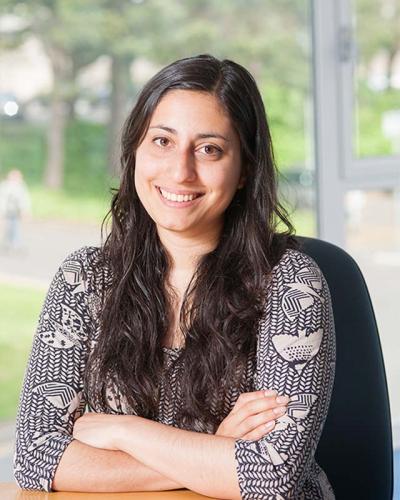The Software Sustainability Institute 2018 highlights
Posted on 14 December 2018
The Software Sustainability Institute 2018 highlights
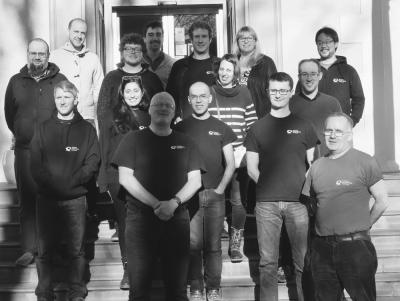 The Software Sustainability Institute team.
The Software Sustainability Institute team. By Selina Aragon, Communications Lead.
2018 has been an action-packed and successful year for the Institute. We’ve organised and attended workshops around research software and training, collaborated with an array of research projects from all domains, recruited and offered support to another cohort of Fellows, among other activities.
As the year is coming to an end, we thought we’d gather some of our best stories to share them with our readers. So, here’s what we’ve been up to.
Fellowship Programme
Throughout 2018, our Fellows have been very active. Becky Arnold has been organising a series of talks and workshops around good coding practice, software sustainability and other related topics, from “Software engineering in practice” to “Demystifying Big Data, machine learning and all that.”
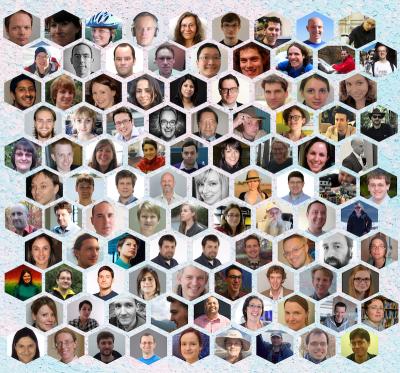 Institute Fellows 2012-2018.
Institute Fellows 2012-2018.Tania Allard received the John Pinner Award at PyConUK 18, and Alex Morley was awarded a Mozilla Fellowship for Science working towards making research more accessible, inclusive and reproducible. Finally, Yo Yehudi and Nikoleta Glynatsi, Institute Fellows from the 2017 cohort, became the first Software editors for the PLOS Open Source Toolkit Channel.
This year, Shoaib Sufi, Institute Community Lead, and Caroline Jay, Institute Co-Investigator and Fellow, wrote the paper “Raising the status of software in research: A survey-based evaluation of the Software Sustainability Institute Fellowship Programme” (in open-peer review). The results show that the Fellowship has played a wide-ranging role in supporting communities of practice and skills transfer and in raising the profile of software in research.
Every year, with the help of the Institute, our Fellows take further steps towards good practices in research software in their areas of research/work. If you’re passionate about research software, consider submitting an application to join the 2019 cohort. We will be running a Launch Webinar early next year to give an overview of the Programme and answer any questions related to the Fellowship.
Training and projects highlights
Our training highlights include the publication of the Data Carpentry Social Science Curriculum, the launch of HPC Carpentry lessons, and the beginning of a The Carpentries chapter in Edinburgh. The first CarpentryCon took place back in May 2018, and five of our Institute staff, including Aleks Nenadic, Institute Training Lead, attended and ran skill-up sessions. Following the success of CarpentryCon, the Institute is now organising a CarpentryConnect Manchester event to take place in June 2019.
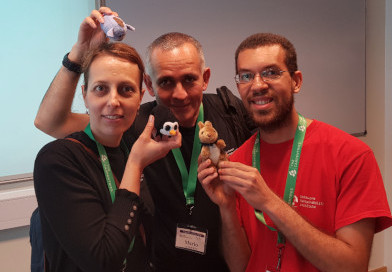 Aleks Nenadic, Mario Antonioletti and
Aleks Nenadic, Mario Antonioletti andRaniere Silva at CarpentryCon.
Back in September, Steve Crouch, Institute Software Lead, put together and delivered a training workshop for CESSSDA, the Consortium of European Social Science Data Archives. The workshop aimed to raise the baseline of researcher skills, provided guidance on how to run a hackathon, and reviewed the developer technical guidance for the EURISE Technical Network.
Earlier this year, Mike Jackson, Institute RSE, collaborated alongside colleagues at EPCC to help the PickCells project get into a state suitable for more widespread promotion to encourage deeper community engagement. The project lead, Sally Lowell, has now secured a Wellcome Trust enrichment award to keep working on improving the usability of the project. We’ve also heard from DMACRYS that our work has been responsible for 15 to 55 publications and has been helpful with uptake from developers and researchers.
Research Software Engineers (RSEs)
The term “Research Software Engineer” (RSE) was first coined in 2012. Four years later, the community in the UK and worldwide keeps growing at a fast pace. Just last September, the Third RSE Conference gathered 314 delegates from 12 countries, and the UK RSE committee announced the launch of the Society of Research Software Engineering in early 2019.
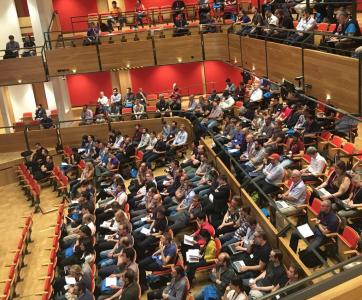 RSE18. Image courtesy of Cristin Merritt.
RSE18. Image courtesy of Cristin Merritt.In January 2018, RSE leaders from around the world attended the first International RSE leaders workshop, organised by UK RSE and funded by the Institute’s EPSRC USA-UK RSE Travel Fund. The 41 people from 11 countries that took part in the workshop have been leading or setting up research software groups, national networks or initiatives to improve access to software skills in research. The organisers have collated the outputs of the workshop in a poster.
2018 has seen new RSE groups forming in the UK and abroad. Mario Antonioletti, Institute RSE, and Giacomo Peru, Institute Project Officer, have co-organised the first couple of Community Edinburgh RSE (CERSE) meetings. The aim is to help build a self-sustaining community in Edinburgh that will be able to support its members and create a sense of community.
In past years, the Institute has been publishing and collating data from individual surveys in various countries in the past two years to gather information about RSEs. This year, we have published the first international RSE Survey calling for RSEs from all over the world to participate. The survey is still open – if you’re coding in or for academia/research, you can help us by filling it in before 31st December.
Reports
Back in March, we ran our annual Collaborations Workshop 2018, which focussed on Culture Change, Productivity, and Sustainability. – a pre-print of the report is available. We’re already looking ahead to Collaborations Workshops 2019 (1st to 3rd April 2019 at Loughborough University), which will host discussions around interoperability, documentation training, and sustainability.
CW19 #collabw19 will bring people together to explore best practices & the future of research #software. Topics are #interoperability, #documentation, #training & #sustainability.
Join us from 1-3 Apr 19 at Loughborough University: https://t.co/TeXhInFukr #WhyAttendCollabW19 pic.twitter.com/LBJoMeEgDt
Coordinated by Shoaib Sufi, our Community Lead, “Ten Simple Rules for Measuring the Impact of Workshops” was published on PLOS Computational Biology, and it was the result of the work done at the Measuring of Impact of Workshops (MIW) Workshop. The paper outlines a few rules to evaluate the impact of their workshops in a better way, to collect data for funders, to improve future events and to show value to potential attendees.
In March 2018, the Institute co-organised a Software Deposit and Preservation Policy and Planning Workshop, where Mike Jackson presented work done by the Institute to examine the current workflows used to preserve software as a research object, as part of research data management procedures. A summary of the workshop and workflow diagrams are available in the Software Deposit and Preservation Policy and Planning Workshop Report.
What’s next?
We’re very excited to see what 2019 has in store for us, so keep an eye out for our return in the New Year to have a sneak-peak at our activities coming up in 2019!
After having a busy year, the Software Sustainability Institute staff will be offline from 21st December to 3rd January. During this time we will not be responding to enquiries.
Leave a comment, ask a question, or start a conversation by contacting us at info@software.ac.uk or on Twitter @SoftwareSaved.

